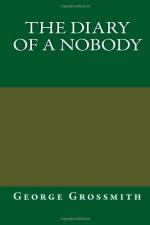We were introduced to Miss Posh, whom Lupin called “Little Girl,” as if he had known her all his life. She was very tall, rather plain, and I thought she was a little painted round the eyes. I hope I am wrong; but she had such fair hair, and yet her eyebrows were black. She looked about thirty. I did not like the way she kept giggling and giving Lupin smacks and pinching him. Then her laugh was a sort of a scream that went right through my ears, all the more irritating because there was nothing to laugh at. In fact, Carrie and I were not at all prepossessed with her. They all smoked cigarettes after dinner, including Miss Posh, who startled Carrie by saying: “Don’t you smoke, dear?” I answered for Carrie, and said: “Mrs. Charles Pooter has not arrived at it yet,” whereupon Miss Posh gave one of her piercing laughs again.
Mrs. Posh sang a dozen songs at least, and I can only repeat what I have said before—she does not sing in tune; but Lupin sat by the side of the piano, gazing into her eyes the whole time. If I had been Mr. Posh, I think I should have had something to say about it. Mr. Posh made himself very agreeable to us, and eventually sent us home in his carriage, which I thought most kind. He is evidently very rich, for Mrs. Posh had on some beautiful jewellery. She told Carrie her necklace, which her husband gave her as a birthday present, alone cost 300 pounds.
Mr. Posh said he had a great belief in Lupin, and thought he would make rapid way in the world.
I could not help thinking of the 600 pounds Mr. Posh lost over the Parachikka Chlorates through Lupin’s advice.
During the evening I had an opportunity to speak to Lupin, and expressed a hope that Mr. Posh was not living beyond his means.
Lupin sneered, and said Mr. Posh was worth thousands. “Posh’s one-price hat” was a household word in Birmingham, Manchester, Liverpool, and all the big towns throughout England. Lupin further informed me that Mr. Posh was opening branch establishments at New York, Sydney, and Melbourne, and was negotiating for Kimberley and Johannesburg.
I said I was pleased to hear it.
Lupin said: “Why, he has settled over 10,000 pounds on Daisy, and the same amount on ‘Lillie Girl.’ If at any time I wanted a little capital, he would put up a couple of ‘thou’ at a day’s notice, and could buy up Perkupp’s firm over his head at any moment with ready cash.”
On the way home in the carriage, for the first time in my life, I was inclined to indulge in the radical thought that money was not properly divided.
On arriving home at a quarter-past eleven, we found a hansom cab, which had been waiting for me for two hours with a letter. Sarah said she did not know what to do, as we had not left the address where we had gone. I trembled as I opened the letter, fearing it was some bad news about Mr. Perkupp. The note was: “Dear Mr. Pooter,—Come down to the Victoria Hotel without delay. Important. Yours truly, Hardfur Huttle.”




